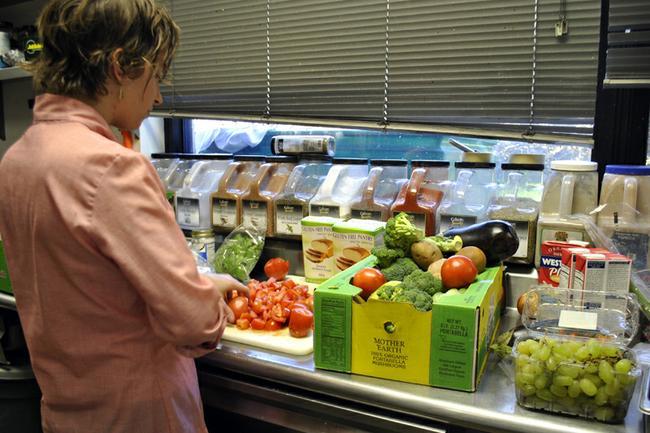
Every Monday, volunteers from Food Not Bombs, a local service organization, come together in Café Berlin’s kitchen to prepare vegetarian food and serve it free of charge to the community. They prepare everything from fruit salads to warm buttered bread and invite anyone who is willing to hang out and discuss human rights, according to the organization’s website.
“Its all impromptu cooking,” volunteer Molly Zapp said. “All of the food is by donation, so we work with whatever donations we have for the week.”
After volunteers finish preparing both the raw produce and warm food, they pack the food up and take it to the circular arrangement of benches next to First Christian Church on the corner of East Walnut and Ninth streets.
FNB is a loose global movement that promotes pacifism and fights hunger while staying health and environmentally conscious, according to the group’s website. All packaging is recycled, and all inedible parts of the donated food goes into compost piles. Volunteers serve vegan and vegetarian foods in acknowledgement of veganism and vegetarianism as a healthier way of eating and in protest of some methods of meat preparation that aren’t conscious of animal rights.
Antinuclear activists in Cambridge, Mass., started the movement in the 1980s as a statement protesting nuclear arms and discrimination against the homeless. It now boasts 400 chapters globally, about half of those in various cities across the United States.
In some cities, FNB practices dumpster diving, or serving previously discarded foods. In Columbia, Clovis Farmers Market and Uprise Bakery donate most of the food, and all is used except items with obvious mold. Zapp has a simple test for testing the edibility of the food.
“If you wonder, give it a taste,” she said.
FNB is a decentralized organization, meaning each chapter follows a very loose set of guidelines and ideals and practices for individual chapters vary. There are no heads of chapters and no rigidly assigned jobs.
“In some ways there is a lot less structure, but then there are less barriers to entry,” Zapp said.
MU sophomore Luke Welsh volunteered for the second time Monday. Welsh said he returns because he enjoys the atmosphere in the kitchen during FNB.
“It’s fun, cool, laid-back, and it’s a bunch of causes rolled into one,” he said. “I’ll definitely be back next week.”
Volunteers of FNB hope to extend their organization’s days of active service, perhaps through a chapter at MU, volunteer Marcus Johnson said.
“I can imagine university organizations coming together with FNB, like Sustainahouse and (Tiger) Pantry,” Johnson said. “The idea is not to have one group that serves food, but to have seven serving every day.”